Unrepentant Homestuck. Apparently I write mostly dream bubble pesterfic with angst, death, farce, and shipping, in any convenient order or mix. Expect fic updates on Mondays US time, when there is one. Main @caledfwlchthat for more HS nonsense. AO3. Twitter (not that I check it).
Don't wanna be here? Send us removal request.
Photo
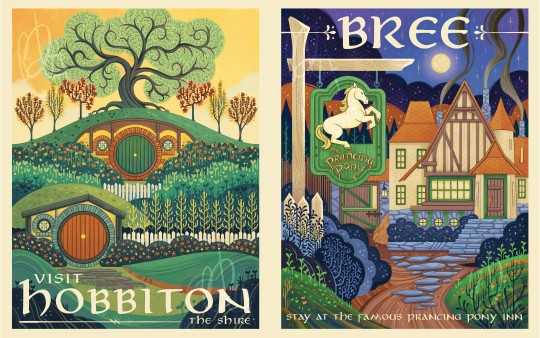
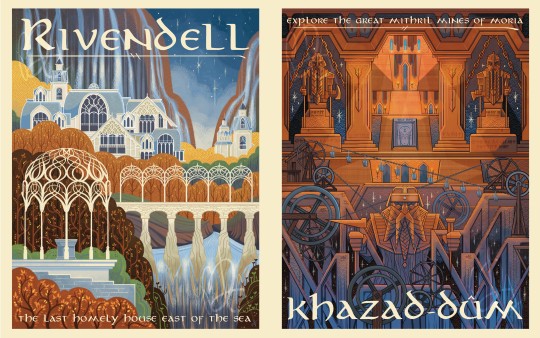

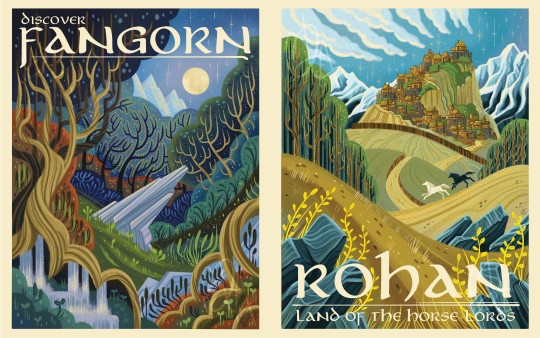
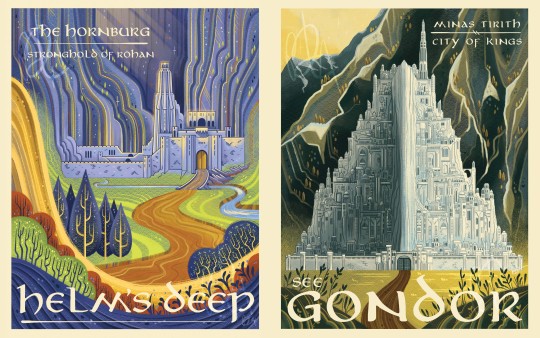
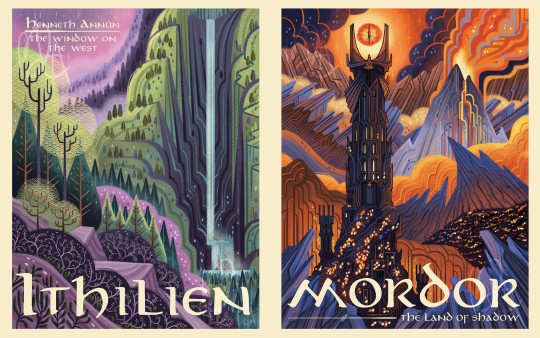
The full set of all of my LOTR pieces! they are currently available at Gallery Nucleus!
#not homestuck#lord of the rings#travel posters#in case you didn't want to go there already#or for that matter especially if you did
22K notes
·
View notes
Note
oooh have you ever done a post about the ridiculous mandatory twist endings in old sci-fi and horror comics? Like when the guy at the end would be like "I saved the Earth from Martians because I am in fact a Vensuvian who has sworn to protect our sister planet!" with no build up whatsoever.

Yeah, that is a good question - why do some scifi twist endings fail?
As a teenager obsessed with Rod Serling and the Twilight Zone, I bought every single one of Rod Serling’s guides to writing. I wanted to know what he knew.
The reason that Rod Serling’s twist endings work is because they “answer the question” that the story raised in the first place. They are connected to the very clear reason to even tell the story at all. Rod’s story structures were all about starting off with a question, the way he did in his script for Planet of the Apes (yes, Rod Serling wrote the script for Planet of the Apes, which makes sense, since it feels like a Twilight Zone episode): “is mankind inherently violent and self-destructive?” The plot of Planet of the Apes argues the point back and forth, and finally, we get an answer to the question: the Planet of the Apes was earth, after we destroyed ourselves. The reason the ending has “oomph” is because it answers the question that the story asked.

My friend and fellow Rod Serling fan Brian McDonald wrote an article about this where he explains everything beautifully. Check it out. His articles are all worth reading and he’s one of the most intelligent guys I’ve run into if you want to know how to be a better writer.
According to Rod Serling, every story has three parts: proposal, argument, and conclusion. Proposal is where you express the idea the story will go over, like, “are humans violent and self destructive?” Argument is where the characters go back and forth on this, and conclusion is where you answer the question the story raised in a definitive and clear fashion.
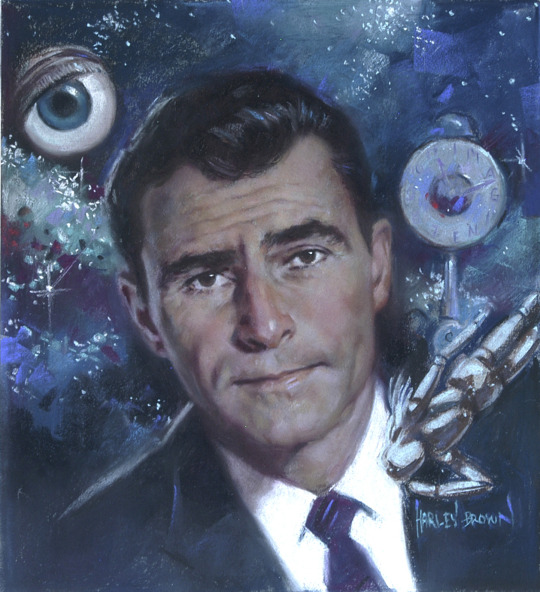
The reason that a lot of twist endings like those of M. Night Shyamalan’s and a lot of the 1950s horror comics fail is that they’re just a thing that happens instead of being connected to the theme of the story.
One of the most effective and memorable “final panels” in old scifi comics is EC Comics’ “Judgment Day,” where an astronaut from an enlightened earth visits a backward planet divided between orange and blue robots, where one group has more rights than the other. The point of the story is “is prejudice permanent, and will things ever get better?” And in the final panel, the astronaut from earth takes his helmet off and reveals he is a black man, answering the question the story raised.
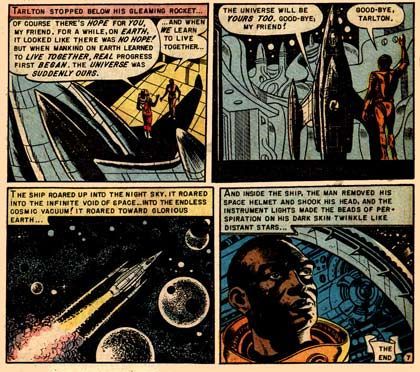
99K notes
·
View notes
Text
The Three Commandments
The thing about writing is this: you gotta start in medias res, to hook your readers with action immediately. But readers aren’t invested in people they know nothing about, so start with a framing scene that instead describes the characters and the stakes. But those scenes are boring, so cut straight to the action, after opening with a clever quip, but open in the style of the story, and try not to be too clever in the opener, it looks tacky. One shouldn’t use too many dialogue tags, it’s distracting; but you can use ‘said’ a lot, because ‘said’ is invisible, but don’t use ‘said’ too much because it’s boring and uninformative – make sure to vary your dialogue tags to be as descriptive as possible, except don’t do that because it’s distracting, and instead rely mostly on ‘said’ and only use others when you need them. But don’t use ‘said’ too often; you should avoid dialogue tags as much as you possibly can and indicate speakers through describing their reactions. But don’t do that, it’s distracting.
Having a viewpoint character describe themselves is amateurish, so avoid that. But also be sure to describe your viewpoint character so that the reader can picture them. And include a lot of introspection, so we can see their mindset, but don’t include too much introspection, because it’s boring and takes away from the action and really bogs down the story, but also remember to include plenty of introspection so your character doesn’t feel like a robot. And adverbs are great action descriptors; you should have a lot of them, but don’t use a lot of adverbs; they’re amateurish and bog down the story. And
The reason new writers are bombarded with so much outright contradictory writing advice is that these tips are conditional. It depends on your style, your genre, your audience, your level of skill, and what problems in your writing you’re trying to fix. Which is why, when I’m writing, I tend to focus on what I call my Three Commandments of Writing. These are the overall rules; before accepting any writing advice, I check whether it reinforces one of these rules or not. If not, I ditch it.
1: Thou Shalt Have Something To Say
What’s your book about?
I don’t mean, describe to me the plot. I mean, why should anybody read this? What’s its thesis? What’s its reason for existence, from the reader’s perspective? People write stories for all kinds of reasons, but things like ‘I just wanted to get it out of my head’ are meaningless from a reader perspective. The greatest piece of writing advice I ever received was you putting words on a page does not obligate anybody to read them. So why are the words there? What point are you trying to make?
The purpose of your story can vary wildly. Usually, you’ll be exploring some kind of thesis, especially if you write genre fiction. Curse Words, for example, is an exploration of self-perpetuating power structures and how aiming for short-term stability and safety can cause long-term problems, as well as the responsibilities of an agitator when seeking to do the necessary work of dismantling those power structures. Most of the things in Curse Words eventually fold back into exploring this question. Alternately, you might just have a really cool idea for a society or alien species or something and want to show it off (note: it can be VERY VERY HARD to carry a story on a ‘cool original concept’ by itself. You think your sky society where they fly above the clouds and have no rainfall and have to harvest water from the clouds below is a cool enough idea to carry a story: You’re almost certainly wrong. These cool concept stories work best when they are either very short, or working in conjunction with exploring a theme). You might be writing a mystery series where each story is a standalone mystery and the point is to present a puzzle and solve a fun mystery each book. Maybe you’re just here to make the reader laugh, and will throw in anything you can find that’ll act as framing for better jokes. In some genres, readers know exactly what they want and have gotten it a hundred times before and want that story again but with different character names – maybe you’re writing one of those. (These stories are popular in romance, pulp fantasy, some action genres, and rather a lot of types of fanfiction).
Whatever the main point of your story is, you should know it by the time you finish the first draft, because you simply cannot write the second draft if you don’t know what the point of the story is. (If you write web serials and are publishing the first draft, you’ll need to figure it out a lot faster.)
Once you know what the point of your story is, you can assess all writing decisions through this lens – does this help or hurt the point of my story?
2: Thou Shalt Respect Thy Reader’s Investment
Readers invest a lot in a story. Sometimes it’s money, if they bought your book, but even if your story is free, they invest time, attention, and emotional investment. The vast majority of your job is making that investment worth it. There are two factors to this – lowering the investment, and increasing the payoff. If you can lower your audience’s suspension of disbelief through consistent characterisation, realistic (for your genre – this may deviate from real realism) worldbuilding, and appropriately foreshadowing and forewarning any unexpected rules of your world. You can lower the amount of effort or attention your audience need to put into getting into your story by writing in a clear manner, using an entertaining tone, and relying on cultural touchpoints they understand already instead of pushing them in the deep end into a completely unfamiliar situation. The lower their initial investment, the easier it is to make the payoff worth it.
Two important notes here: one, not all audiences view investment in the same way. Your average reader views time as a major investment, but readers of long fiction (epic fantasies, web serials, et cetera) often view length as part of the payoff. Brandon Sanderson fans don’t grab his latest book and think “Uuuugh, why does it have to be so looong!” Similarly, some people like being thrown in the deep end and having to put a lot of work into figuring out what the fuck is going on with no onboarding. This is one of science fiction’s main tactics for forcibly immersing you in a future world. So the valuation of what counts as too much investment varies drastically between readers.
Two, it’s not always the best idea to minimise the necessary investment at all costs. Generally, engagement with art asks something of us, and that’s part of the appeal. Minimum-effort books do have their appeal and their place, in the same way that idle games or repetitive sitcoms have their appeal and their place, but the memorable stories, the ones that have staying power and provide real value, are the ones that ask something of the reader. If they’re not investing anything, they have no incentive to engage, and you’re just filling in time. This commandment does not exist to tell you to try to ask nothing of your audience – you should be asking something of your audience. It exists to tell you to respect that investment. Know what you’re asking of your audience, and make sure that the ask is less than the payoff.
The other way to respect the investment is of course to focus on a great payoff. Make those characters socially fascinating, make that sacrifice emotionally rending, make the answer to that mystery intellectually fulfilling. If you can make the investment worth it, they’ll enjoy your story. And if you consistently make their investment worth it, you build trust, and they’ll be willing to invest more next time, which means you can ask more of them and give them an even better payoff. Audience trust is a very precious currency and this is how you build it – be worth their time.
But how do you know what your audience does and doesn’t consider an onerous investment? And how do you know what kinds of payoff they’ll find rewarding? Easy – they self-sort. Part of your job is telling your audience what to expect from you as soon as you can, so that if it’s not for them, they’ll leave, and if it is, they’ll invest and appreciate the return. (“Oh but I want as many people reading my story as possible!” No, you don’t. If you want that, you can write paint-by-numbers common denominator mass appeal fic. What you want is the audience who will enjoy your story; everyone else is a waste of time, and is in fact, detrimental to your success, because if they don’t like your story then they’re likely to be bad marketing. You want these people to bounce off and leave before you disappoint them. Don’t try to trick them into staying around.) Your audience should know, very early on, what kind of an experience they’re in for, what the tone will be, the genre and character(s) they’re going to follow, that sort of thing. The first couple of chapters of Time to Orbit: Unknown, for example, are a micro-example of the sorts of mysteries that Aspen will be dealing with for most of the book, as well as a sample of their character voice, the way they approach problems, and enough of their background, world and behaviour for the reader to decide if this sort of story is for them. We also start the story with some mildly graphic medical stuff, enough physics for the reader to determine the ‘hardness’ of the scifi, and about the level of physical risk that Aspen will be putting themselves at for most of the book. This is all important information for a reader to have.
If you are mindful of the investment your readers are making, mindful of the value of the payoff, and honest with them about both from the start so that they can decide whether the story is for them, you can respect their investment and make sure they have a good time.
3: Thou Shalt Not Make Thy World Less Interesting
This one’s really about payoff, but it’s important enough to be its own commandment. It relates primarily to twists, reveals, worldbuilding, and killing off storylines or characters. One mistake that I see new writers make all the time is that they tank the engagement of their story by introducing a cool fun twist that seems so awesome in the moment and then… is a major letdown, because the implications make the world less interesting.
“It was all a dream” twists often fall into this trap. Contrary to popular opinion, I think these twists can be done extremely well. I’ve seen them done extremely well. The vast majority of the time, they’re very bad. They’re bad because they take an interesting world and make it boring. The same is true of poorly thought out, shocking character deaths – when you kill a character, you kill their potential, and if they’re a character worth killing in a high impact way then this is always a huge sacrifice on your part. Is it worth it? Will it make the story more interesting? Similarly, if your bad guy is going to get up and gloat ‘Aha, your quest was all planned by me, I was working in the shadows to get you to acquire the Mystery Object since I could not! You have fallen into my trap! Now give me the Mystery Object!’, is this a more interesting story than if the protagonist’s journey had actually been their own unmanipulated adventure? It makes your bad guy look clever and can be a cool twist, but does it mean that all those times your protagonist escaped the bad guy’s men by the skin of his teeth, he was being allowed to escape? Are they retroactively less interesting now?
Whether these twists work or not will depend on how you’ve constructed the rest of your story. Do they make your world more or less interesting?
If you have the audience’s trust, it’s permissible to make your world temporarily less interesting. You can kill off the cool guy with the awesome plan, or make it so that the Chosen One wasn’t actually the Chosen One, or even have the main character wake up and find out it was all a dream, and let the reader marinate in disappointment for a little while before you pick it up again and turn things around so that actually, that twist does lead to a more interesting story! But you have to pick it up again. Don’t leave them with the version that’s less interesting than the story you tanked for the twist. The general slop of interest must trend upward, and your sacrifices need to all lead into the more interesting world. Otherwise, your readers will be disappointed, and their experience will be tainted.
Whenever I’m looking at a new piece of writing advice, I view it through these three rules. Is this plot still delivering on the book’s purpose, or have I gone off the rails somewhere and just stared writing random stuff? Does making this character ‘more relateable’ help or hinder that goal? Does this argument with the protagonists’ mother tell the reader anything or lead to any useful payoff; is it respectful of their time? Will starting in medias res give the audience an accurate view of the story and help them decide whether to invest? Does this big twist that challenges all the assumptions we’ve made so far imply a world that is more or less interesting than the world previously implied?
Hopefully these can help you, too.
3K notes
·
View notes
Text
on worldbuilding, and what people think is going on
there is one facet of fantasy worldbuilding that is, to me, the most interesting and essential but i don't see it come up in worldbuilding guides or writing prompts or anything, and that is the question of:
what do the inhabitants of your world believe about how the world works, and how are they wrong? a lot of fantasy media will set up their cosmology, gods, magic systems, planar systems, concepts of the afterlife, &c., and proceed as though the inhabitants of the world know and understand them.
from someone whose entire academic career is focused on studying human culture in various regions and time periods, with a focus on belief systems (religion, occultism, mythology, folklore): that sort of worldbuilding is unrealistic and missing out on so much fun.
people are always seeking new understanding about how the world works, and they are mostly wrong. how many models of the solar system were proposed before we reached our current one? look at the long, turbulent history of medicine and our various bizarre models for understanding the human body and how to fix it. so many religions and occult/magical traditions arise from people disagreeing with or adapting various models of the world based on new ideas, methods, technologies. many of them are wrong, but all of them are interesting and reflect a lot about the culture, beliefs, values, and fears of the people creating/practising them.
there is so much more to the story of what people believe about the world than just what is true.
to be clear: i think it's fine and important for the author to have a coherent explanation for where magic comes from or who the gods are, so they can maintain consistency in their story. but they should also be asking what people in the world (especially different people, in different regions/nations and different times) think is happening when they do magic, or say a prayer, or practise medicine, or grieve their dead. it is a rich vein for conflict between individuals and nations alike when two models of the world disagree. it is fascinating how different magic systems might develop according to different underlying beliefs.
personally, i think it is the most fun to spawn many diverse models of the world, but give none of them the 'right' answer.
(bonus points if you also have a thriving academic system in the world with its own theory, research, and discourse between factions! as an academic, it is very fun to imagine fictional academic debate over the topics i'm worldbuilding. sometimes i will be working out details for some underlying mechanic of the world and start imagining the papers being written by scholars researching it)
3K notes
·
View notes
Text
There should be a fanfic writing game called the showrunners challenge where someone writes a story and partway through someone else can play things like "actor leaves after 4000 more words" or "topic now too politically sensitive due to unforeseen world events" or "lost rights to that reference"
39K notes
·
View notes
Text
If your plot feels flat, STUDY it! Your story might be lacking...
Stakes - What would happen if the protagonist failed? Would it really be such a bad thing if it happened?
Thematic relevance - Do the events of the story speak to a greater emotional or moral message? Is the conflict resolved in a way that befits the theme?
Urgency - How much time does the protagonist have to complete their goal? Are there multiple factors complicating the situation?
Drive - What motivates the protagonist? Are they an active player in the story, or are they repeatedly getting pushed around by external forces? Could you swap them out for a different character with no impact on the plot? On the flip side, do the other characters have sensible motivations of their own?
Yield - Is there foreshadowing? Do the protagonist's choices have unforeseen consequences down the road? Do they use knowledge or clues from the beginning, to help them in the end? Do they learn things about the other characters that weren't immediately obvious?
93K notes
·
View notes
Text
There should be a fanfic writing game called the showrunners challenge where someone writes a story and partway through someone else can play things like "actor leaves after 4000 more words" or "topic now too politically sensitive due to unforeseen world events" or "lost rights to that reference"
39K notes
·
View notes
Text
Fandom: Homestuck Rating: Teen and Up Audiences Archive Warnings: Major Character Death(s) Category: Gen Characters: Sollux Captor, Karkat Vantas, Terezi Pyrope Additional tags: Doomed Timeline(s) (Homestuck), Computer Jokes, Suicidal Thoughts, Or Are They Technically Homicidal?, Anyone out there wondering what the Mage class does, it's probably something like this, Existential Angst, Moral Ambiguity, Trolley Problem, ~ATH (Homestuck) Summary: CG: WHAT I'M ASKING FOR IS A HINT ON THIS PROGRAMMING PROBLEM I TOLD YOU ABOUT LAST WEEK, YOU RECALCITRANT BEESLURPER. CG: I'VE BEEN LOSING MY GODDAMN MIND TRYING TO COME UP WITH A SOLUTION THAT SEEMS LIKELY TO TERMINATE BEFORE THE END OF THE UNIVERSE. TA: 2ee, that2 probably your problem riight there. CG: WHAT. WHAT IS MY PROBLEM. CG: WAIT A SECOND, IS THIS ACTUALLY A HINT?! IF SO, IT'S TERRIBLE. TA: never miind. ju2t a 2hiitty joke.
Notes:
Quantum bogosort: A hypothetical sorting algorithm based on bogosort, created as an in-joke among computer scientists. The algorithm generates a random permutation of its input using a quantum source of entropy, checks if the list is sorted, and, if it is not, destroys the universe. Assuming that the many-worlds interpretation holds, the use of this algorithm will result in at least one surviving universe where the input was successfully sorted in O(n) time. -- From the Wikipedia article for "Bogosort"
This started out as a joke fic because obviously, obviously, any real implementation of Quantum Bogosort would have to be written in ~ATH. But I found myself engaging seriously with the premise, which gave it all quite a bit darker (though canon-typical) flavor. At the end of the day I'm always pleased to find new ways (for me!) to engage with beloved and familiar characters.
Fondly written for the Retcon Timeline gang. Happy 4/13, friends, and thanks for sharing a fandom with me. :)
#homestuck#homestuck fanfic#413#sollux captor#karkat vantas#terezi pyrope#and many happy returns for all who celebrate
15 notes
·
View notes
Text
If you're reading this...
go write three sentences on your current writing project.
375K notes
·
View notes
Text
I’ve said this before and I’ll say it again: 99% of peoples criticisms of the end chunk of homestuck completely fall apart if you take a thematic reading. homestuck is aggressively thematically cohesive straight to the end and SO many people interpret that as insulting the audience or a copout
2K notes
·
View notes
Text
It is a painful truth that actually none of my fics are abandoned, no, not even the ones that haven’t updated in five years. I still know exactly what happens next, and after that, and so on. They’re not abandoned; they’re right here, haunting me, characters climbing up my pants like kittens nagging for dinner.
46K notes
·
View notes
Text
my favourite kinds of ao3 comments to get
the ones that tell me about what you're doing while reading e.g. "i stayed up past my bedtime reading this" / "trying not to laugh in the dentist's waiting room rn" / "this fic brightened up a boring road trip" / "it's my birthday and this was a very good present to get!"
comments that talk about which themes resonate with you personally like "this made me feel seen" / "your treatment of these issues reads very sincere" / "this was my favourite part of canon and you've run with it"
long analyses of what's going on in the fic that hit the goddamn nail on the head for what i was trying to do and sometimes notice things i didn't even REALISE i was trying to do. my favourite thing to do with fanfic is provide new insight to an existing character or world and damn these comments Get Me
the ones that get incoherent about loving the fic e.g. "GFAKJEDFAERWE" / "omg omgomg whAT WAS THAT i'm dying dead ogod im DEAD"
bonus points for ones that address me specifically like "HOW COULD YOU DO THIS TO ME" / "YOU'RE SO EVILLLLL!!!" "HEY OP WANNA GET MARRIED??"
there's lots of feelings but you're somehow keeping it together and describing them (with maybe a lil keysmash as a treat)
copying and pasting favourite quotes from the fic so that i know exactly which parts you liked
the ones that use so many emojis always brighten my day
predictions for future chapters that both inspire me and give me knifecat glee about how i'm gonna surprise you
the ones that talk directly to the characters like "noooo why would you SAY that, character!!! don't you know how she feels!!"
the ones where you say or imply that you talk about my fic with other people, maybe because you've been recommended it or because you share updates with your friends
the ones that very politely and formally say that you're enjoying the fic
"extra kudos" / "great chapter!" "<3" and other simple ones
all comments, sincerely
let me know your fave comments too
13 notes
·
View notes
Text
state of the book
(Attention conservation notice: long, kinda navel-gazey. There are some specifics at the start and end.)
There are 7 chapters remaining in Almost Nowhere.
I'm about halfway through writing the first of those. The current plan is to post that first chapter when I'm done with it, and then stop with the serial updates until I've written all of the remaining six. Then, I'll post those all at once.
----
When I got near enough to the end of writing Floornight, it got frustrating to write in a new way.
The fact that I wasn't just done already was agonizing. Once the finish line got close enough for me to see, the remaining distance felt like it was taunting me.
How did I react? I let it go on for a little while, and then one evening I said "you know what, fuck it, let's get this over with." And I sat down and wrote the last two chapters.
I wrote them with the attitude of a checked-out high school senior racing through his last homework assignment. I wrote them unusually fast, with less "quality control" than usual, and with less passion for the story itself than for the idea of just getting it over with already.
----
When I got near enough to the end of writing The Northern Caves, it got frustrating to write in a new way.
The fact that I wasn't just done already was agonizing. Etc, etc.
I let it go on for a little while, and then one evening I said "you know what, fuck it, let's get this over with."
And I sat down and wrote the last five chapters, in one evening. Unusually fast, with less "quality control" than usual, etc., etc.
I often drink a bit when I'm writing, but I drank more than usual that evening. A checked-out senior, already mentally on summer break. Fuck it. Just get it over with.
----
I have now reached this point of ending-related frustration with Almost Nowhere.
I'm not going to do the "fuck it, let's end this tonight" thing a third time, though.
The endings of my earlier 2 novels were, uh ... not ideal, in a lot of ways. Some of those are related to plot and structure, and can't really be blamed on the way I kind of gave up 90% of the way though.
But there's a weird, sudden, desultory, incompletely sketched feel to those endings that I'm sure was a result of the way they were produced. It wasn't some necessary implication of the broader construction. It was just that I gave up.
And I can just ... not do that. And get a better last part of the book out of it. And then it'll be there, forever, in its better state.
----
(I think this frustration largely stems from serial writing?
Thanks to the peak-end rule [among other factors], endings are pretty important. But the further you go in a serial, the more constrained you are.
No matter how much you plan ahead, there's always some maneuvering room, some opportunities to be creative on the fly, to surprise and delight yourself.
This decreases monotonically as you get further along. You feel less and less like you're creating something in the big, exciting, easily romanticized sense of that word, and more and more like you're doing the yeoman work of painting in fine details between pre-established lines and keyframes.
The upside risk declines faster than the downside risk. In the middle of a serial, you can always fantasize about how great the remaining parts will be -- great in ways you might not ever have expected! And you're not wrong: there ARE things you'll only invent later, which you'll feel proud of, and will be unable to imagining lacking once you've made their acquaintance.
As you near the end, this potential goes away. But there is still the need to paint in between those sketchy lines and keyframes. If you do this very well, the result will be simply as you have imagined it -- not superior to your current vision, in some heretofore-unimagined manner, but only what you already have in mind, ably executed. However, there is still the possibility of severe failure: those painted details could go very wrong indeed. There is a ceiling, now -- but there is still no floor.
That's why I have trouble with endings, I think. But it's no excuse for not doing them well. It's hard, but many things are hard. I simply need to not give up.)
----
Long story short, I really want to be done with the book!! This is eating away at me, every day.
Unfortunately, this year continues to be mildly cursed as far as writing is concerned.
I'm finally (I think? fingers crossed??) coming out of the depressive funk that has afflicted me for most of the year.
In its place, the new problem is that I'm sleeping terribly. I've been sleeping terribly, consistently, for at least a few weeks now.
At first it was due to the sun rising earlier. We blacked out the bedroom windows again, but now my circadian rhythm is all messed up, giving the problem its own momentum even after the removal of the initial stimulus. Presumably it'll improve over time.
(Maybe the sleep deprivation actually helped with the depression? That has been known to happen.)
So I'm in this kind of weird state w/r/t the book.
I have a strong emotional motivation to go as quickly as possible.
I also have a strong emotional motivation to "stick the landing," and not feel like I'm giving up 90% of the way through.
I keep finding myself in states where I can't easily produce writing that feels like "sticking the landing," and certainly can't produce it very quickly.
(Probably I need to just take better care of myself, in all sorts of ways, and then the other problems would work themselves out.
That goes against all the instincts I learned in school, of course: you get the final projects and exams over with first, and you "take care of yourself" after -- not the other way around, silly! But I have not been in school for a long time, and should start acting like it.)
Just to be clear, I'm not posting this out of a desire for people to tell me that it's #valid for me to take as long as I need, and to reassure me that I don't need to rush for my (tiny) readership. I believe that all already, and appreciate it. But the impetus to go fast is coming from me, not from any idea about my audience.
----
Some qualitative statistics.
I keep track of (chapters written / time) and also (words written / time).
Both of these have their flaws, but I think the latter is more meaningful overall. Mere verbosity is no virtue, but one does need to write more words when there's a lot that needs to happen, and chapters very in eventfulness.
My average words-per-time rate over the "third act" of AN has been about 60% what it was during the fast period in 2022, when I wrote most of the "second act."
For what it's worth -- which is disputable -- that slower rate is still faster than my average rate over the entirety of TNC. But of course TNC was a lot less wordy.
(I don't know how I expected to write the whole book in 2022. Well, I do, but it involved absurdly optimistic assumptions about the "third act." The conceit was a useful kick in the ass, though.)
A somewhat optimistic extrapolation, using this rate and the average chapter word count in "act 3," says I will take around 5-6 months to write the remaining 7 chapters.
5-6 months is ... actually not that big a hiatus, by my standards! (That says more about "my standards" than anything, but still.)
It does feel absurdly long, though, emotionally. Emotionally, I feel like I ought to be done, like, next week. Come on, it's so close, just "get it over with" --
On a practical level, I'm a little worried about the size of the planned 6-chapter final block. Less from the length of the pause involved, and more due to the possibility of losing momentum... I guess. Maybe I'm spoiled by the immediate feedback of serial release.
I guess I could shrink the size of the final bunch and push out serial release for long. None of that will matter in the long run anyway, for "archival readers." The current plan feels structurally right, though.
----
I set aside the entirety of the past weekend for writing. I worked as hard as I could, and got ~5000 words of the next chapter. It still feels less than half done, honestly.
I was aware that the words were coming less easily than usual, due to my sleep debt.
On Monday evening, after sleeping very badly, I tried to continue, and did write a bit more. I quickly had to admit, though, that I was simply too tired for my brain to make words of the desired quality at any usable rate. So I stopped.
I have a strong emotional motivation to go as quickly as possible. "As quickly as possible" is currently pretty slow. I'll do what I can to improve that.
#writing#relatable#a curious analysis of diminishing possibilities#i'm not sure i react the same way but the issues feel familiar
96 notes
·
View notes
Text
I just wrote 8 pages when I haven't written in months and was beginning to think I'd never be able to again. Idk what it is, but I am sharing and manifesting this energy for every writer who sees this. May you write 8 quality pages effortlessly and find joy writing once more
54K notes
·
View notes
Text
I need people to stop blaming the death of movies on “quips”. A quip is just a funny line of dialogue. That’s all. Like I just saw a post talking about quips and the death of movies and brought up Pirates of the Caribbean as an example of a better movie and yes it is but also that movie is FULL OF QUIPS. I just rewatched The Princess Bride. It’s all quips. Every single line. And it’s a masterpiece.
Movies suck when people don’t care about the art they’re making. That includes them not caring about their quips. Which is why a lot of comic relief dialogue ALSO sucks now. But the problem isn’t that funny dialogue exists.
#not homestuck#and yet very relevant to homestuck#writing#characterization#humor#the princess bride#words to make stuff by
115K notes
·
View notes










